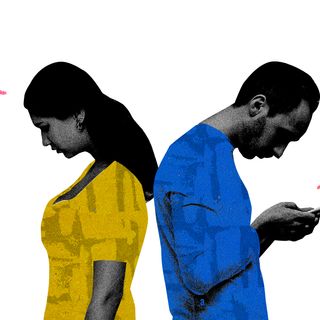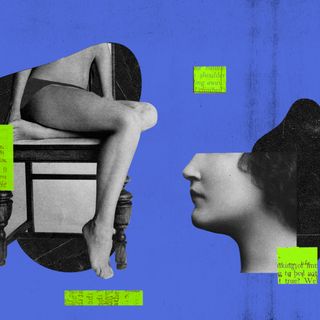
Online Doctor Reviews Are Gender Biased, More Likely to Call Women ‘Cold’: Study
Skewed gender roles impact how women in healthcare navigate the telehealth industry, which is predominantly based on reviews and ratings.

One of the worst-kept secrets in any industry is that men have an edge when it comes to being rated for their services: people tend to like them more, and deem them more competent, compared to women. A chef who is a man will have a higher rating than a chef who is a woman; a doctor who is a woman will most likely have more negative reviews than a doctor who is a man. Women are penalized to an exacting degree.
Within healthcare, the metrics of these assessments are built on an incredible degree of gender bias. While a male doctor’s review is more likely to carry words like “superb” and “compassion[ate],” a female doctor was associated with terms like “cold” and “unprofessional.” These are the findings of a study published recently in JMIR Formative Research. It highlights the extent to which the metrics designed to assess treatment online are laced with misogyny.
The researchers looked at a dataset of doctors who were previously reprimanded for negligence, malpractice, or brought up by respective medical boards for “improper” behavior. Then, using a machine learning tool to parse through online reviews, they looked at ratings and words to show that female doctors were looked at more harshly.
“Because these platforms and rating matter in patient choice,” this research “is a call on platforms to redesign their evaluations in the online reviews to make sure they are as neutral and objective as possible,” saidMargrét Bjarnadóttir, an associate professor of management science and co-author of the study.
Bjarnadóttir points to a problem in waiting in the telehealth industry, which is presently catering to demands that have increased by 38 times since the first wave of the pandemic. Skewed gender roles impact how women in healthcare navigate the telehealth industry, which is predominantly based on reviews and ratings. The world of online consultations was hardlypreferred by both doctors and patients; in India, factors like low internet connectivity, distrust of technology, and the mechanical sheen of treatment have discouraged healthcare seekers. But over the last two years, experts are increasingly of the view that telehealth has “changed the face” of healthcare in India — at least, for an urban demographic.
However, this modern site of treatment has the potential to echo the gender gap that already thrives in science, technology, engineering, and mathematics (STEM) fields — a field notoriousfor being more gender-segregated than others. Women are systemically discouraged from partaking in opportunities and never quite make it to leadership roles, keeping aside the harsh realities of thepay gap, motherhood penalties, and a devaluation of their knowledge.
Related on The Swaddle:
Gender Stereotypes Can Drop Girls’ Interest in STEM by 50%, Suggests Research
In April this year, another study documented the extent of gender bias in online patient reviews. “We were surprised that female doctors were reviewed more on their interpersonal skills and not much on their technical competence, as well as how the reviews explicitly mentioned [the] gender of the women surgeons and physicians,” investigators Sonam Gupta, a doctoral candidate, and Kayla Jordan, an assistant professor noted in an interview. It creates a self-fulfilling prophecy where the mistaken narrative is that men are just better doctors.
One unique determinant of the telehealth industry is how it shifts some agency to an average urban, privileged healthcare consumer. In theory, the idea of reviews in healthcare can improve patient care, urging practitioners to improve the quality of care and even check their own biases. But “honest” and meaningful feedbacks are difficult asks in an industry that is not only governed by ratings, but is alsobuilt on a colossal cultural and social history that favors the masculine, patriarchal, cis-heteronormative identity.
Patients’ biases can then significantly shape not only their personal experiences but thoseof thousands of others browsing online for a consultation; people may view a “cold” male doctor and think of them as competent still, a generosity that is barely bestowed on women.
Arguably, the research also speaks to the double bind of emotional labor and care work that women medical professionals face. Their professional labor in healthcare is seen as one intrinsic to their “caring,” “feminine” nature, which devalues their skills and expertise as doctors.
Related on The Swaddle:
Tell Me More: Talking STEM Education and Bias With the Co‑Founders of The Life of Science
This is not to say all women physicians who interact with patients aren’t devoid of biases. Indians who don’t conform to the gender binary reveal staggering accounts of interactions with female gynecologists and physicians, where they face a barrage of criticism and bias. All doctors have the potential to hold regressive views and even be inelegant in their delivery of care, but the problem lies in assuming that it’s only women who hold this incompetence.
“Whether they can be utilized to improve processes and outcomes will probably depend on the extent to which platforms get better at asking questions that could help healthcare providers to provide better care,” one of the researchers from the April study said.
What could this look like? For one, designing review mechanisms that ask more open-ended questions rather than ones that demand little careful thought, could work. “How was your experience?” may sometimes elicit a misconstrued “good” or “bad,” but something like “What aspects of care did you like?” could carry some more nuance. Awareness among patients of this bias can make them more critical while reading reviews too. “Patient reviews should be carefully considered to determine which criticisms are true points for improvement, like spending more time talking with patients or explaining instructions in more understandable ways, and which reviews may be unreasonable or biased, like personal appearance,” Dr. Jordan said.
Technosolutionism’s marriage with healthcare has no unequivocal verdict. It may improve access to treatment but also unfold new dimensions of prejudicial behavior and reinforce stereotypes that already swarm around women in STEM. Poke deeper and the heart of darkness reveals a tension — between balancing the interest of both patients in need of care and doctors unfairly dismissed by virtue of gender roles.
Saumya Kalia is an Associate Editor at The Swaddle. Her journalism and writing explore issues of social justice, digital sub-cultures, media ecosystem, literature, and memory as they cut across socio-cultural periods. You can reach her at @Saumya_Kalia.
Related


How ‘Phubbing’ Ruins Relationships, According to Science
